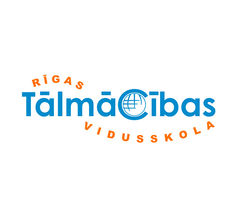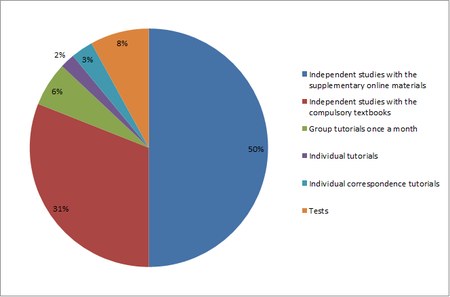Welcome to the Virtual Education Wiki ~ Open Education Wiki
Rigas Talmacibas Vidusskola: Difference between revisions
No edit summary |
|||
| Line 23: | Line 23: | ||
Academic year is divided into 2 terms. Every term students have to do one term-ending test in every subject (except mathematics, natural sciences, the Russian language and English. In those subjects students have to do 2 tests in the second term). The grades are registered in student’s school report. To make sure that the student is ready for the test, it is possible to do small tests after every chapter. The main tools and methods include: lectures, video lectures, RTV's textbooks and tests, interactive materials in each subject (definitions, explanations, illustrations, tests), private lessons with teachers and Skype lessons. | Academic year is divided into 2 terms. Every term students have to do one term-ending test in every subject (except mathematics, natural sciences, the Russian language and English. In those subjects students have to do 2 tests in the second term). The grades are registered in student’s school report. To make sure that the student is ready for the test, it is possible to do small tests after every chapter. The main tools and methods include: lectures, video lectures, RTV's textbooks and tests, interactive materials in each subject (definitions, explanations, illustrations, tests), private lessons with teachers and Skype lessons. | ||
==Impact== | ==Impact== | ||
Revision as of 13:06, 10 May 2012
Rigas Talmacibas vidusskola (Riga Distance Education Secondary School) is a private educational institution which was established in 2009. Riga Distance Education Secondary School offers four programmes: two general secondary education programmes, elementary education programme (from grade 7 to 9) and professional development education programme. Riga Distance Education Secondary School and all the programmes are accredited for six years.
The target audience of Riga Distance Education Secondary School is any person, at any geographical location, who can motivate himself/herself for the self-education. Students study from compulsory textbooks and video materials, which are specifically made for students of Riga Distance Education Secondary School. Each student can use the opportunity to communicate to the teachers using Skype, but once a month they can attend full-time group tutorials.
Description
RTV was established in 2009. Thanks to the support from the Ministry of Education and Science, academic year 2009/2010 was the first one in Latvia where the acquisition of general secondary education in a form of distance education started. From the academic year 2010/2011, also elementary education is being offered.
RTV is the first distance learning school in the Baltic States that is accredited. All of the programs are accredited for the maximum time - 6 years. RTV was established because there was demand for distance education secondary education in Latvia. The main beneficiaries include people who live abroad, athletes, models, people who have not finished their studies, young mothers, business people, disabled people and students that prefer to study at a distance.
Approximate number of students in RTV is 450. However, the number of students changes every week since enrolment procedures are carried out continuously throughout the year. RTV students are from 22 different countries and cover an age group from 14 to 57 years. More than half of the students are full-time students. They are admitted based on their previous school report and start to study in a grade that they need to study in. A small part of the students are studying only those subjects that they want to improve or they have not completed in their previous school.
Riga Distance Education Secondary School teaching staff includes 29 teachers who give lectures every fourth Saturday. 20 of them also work with students on the Internet. Communication between a student and a teacher is carried out via the school’s e-study environment, Skype, phone, email or any other web-based program that both agree to use. In case a student does not want to contact a teacher directly, it is possible to ask questions via permanent staff of the school.
Pedagogy
Most of the teaching is done at their homes. For example, teachers and students discuss the answers to various tasks by using Skype if that is needed or respond by sending explanations to particular questions by email. Full-time tutorials are organized according RTV’s lecturing plan. Private tutorials are also available.
Academic year is divided into 2 terms. Every term students have to do one term-ending test in every subject (except mathematics, natural sciences, the Russian language and English. In those subjects students have to do 2 tests in the second term). The grades are registered in student’s school report. To make sure that the student is ready for the test, it is possible to do small tests after every chapter. The main tools and methods include: lectures, video lectures, RTV's textbooks and tests, interactive materials in each subject (definitions, explanations, illustrations, tests), private lessons with teachers and Skype lessons.
Impact
Organisation and management
Sustainability and transferability
Further information
Rigas Talmacibas Vidusskola (in English)

